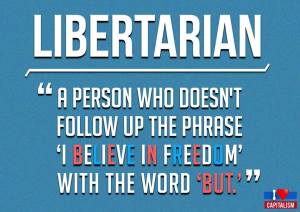 I’ve long ago abandoned the notion that Libertarianism is anything other than a deeply flawed ego-driven ideology, contrary to its adherents’ insistence of its basis in pure rationality. But as much as I try to avoid it, sometimes I get sucked into an online debate on social media and find myself wanting to preserve some of the debate.
I’ve long ago abandoned the notion that Libertarianism is anything other than a deeply flawed ego-driven ideology, contrary to its adherents’ insistence of its basis in pure rationality. But as much as I try to avoid it, sometimes I get sucked into an online debate on social media and find myself wanting to preserve some of the debate.
Today, a libertarian friend mine posted the following on their Facebook wall:
Obnoxious-sounding-but-honest question of the day:
Why do we push for low-income housing in NYC (rent control, stabilization, etc)? It seems a strangely-specific attempt at wealth redistribution that can’t possibly be allocated fairly. What’s wrong with unrestrained real estate prices that mean the ‘good’ neighborhoods end up being exclusively rich? Why do we treat that luxury as something everyone should get…why not insist cars are sold at a loss to low income drivers (for example)? The end result would be that poorer people would have to find housing further out, and their commutes would be longer. But that’s already the case, for the most part, and is a generally-accepted aspect of wealth disparity.
Of course one would likely argue that humanity is improved by a shrinking of said wealth disparity, but this doesn’t change it, it just masks it for a lucky tiny percentage of the population. Doesn’t it?
I assume there’s a good answer for this, considering how widespread the acceptance of the practice.
This post was met with numerous responses including this thoughtful one from someone else:
There’s also the downside of gentrification as produced by market forces.
As rents in crease the poorer members of the neighbourhood have to move out and further away from the jobs they have, resulting in a higher and higher share of their income going to commute & transportation costs, forcing more and more of even those with good budgeting skills to live month-to-month with no savings. While the metro system of NYC and associated bus routes help mitigate that, it does not reduce it completely. Further, think of the shitty public transit in most places and how that affects this problem. Because when those people have to move out of their neighbourhood the only options open to them are low-rent, residential-only neighbourhoods with no jobs in them and further away from any jobs open to them. Neighbourhoods with jobs means those neighbourhoods have services which are convenient which means they cost more to rent or buy in. Vicious cycle.
Also, it’s not about everybody being able to have luxury, it’s about what we are willing to accept as the minimum decent standard of living for everybody. We’re not talking about everybody being able to have the latest octo-core 64gigs of ram gamer’s delight PC and vacationing in southern France every year, but rather a $300 laptop less than 5 years old and a week renting a cottage with friends upstate every couple of years.
Rent control and affordable housing are two of the tools that can be used to at least slow down gentrification and at least help with giving the less well-off a chance at that minimum decent standard of living.
My libertarian friend responded:
OK, I’ve gotten a pretty good feeling for the benefits of artificially manipulating housing costs for the purported benefit of community and social cohesion (and stability, for the revolution-minded).
Now I’d like to hear from the other side. Where my libertarians at? Tell me why the benefits aren’t as good as we think, or why even if the benefits are real the cost is too high, or something.
As I stand now I’m pretty convinced the upside is real and good. I’m less convinced it’s actually feasible and even less convinced we’re doing it well. Perhaps those are really the only objections and this is an optimization problem. But I’d be interested in hearing out those who think it’s a fundamental bad, too.
A bunch of people posted some great arguments, and I chimed in with this:
Also leads to this, allegedly perfectly good restaurants who would certainly thrive if it was merely a matter of market forces but are going out of business anyway simply because of obscenely high rent:http://www.nytimes.com/…/union-square-cafe-joins-other…
After it was suggested high rent was a market force, I made this correction:
Correction: I meant in terms of competition exclusively. One business could prove superior to its competition and still lose for reasons almost completely out of its control.
To which my friend responded:
I am completely unmoved by the plight of Union Square Cafe. They could double their prices to afford to stay, but presumably they would lose customers to cheaper places. So…they’re in a neighborhood where rich people want to eat cheaply, and they must close. That’s the way businesses work. I fail to see a problem here.
My response was:
It’s not about one restaurant but the entire neighborhood. If none of the businesses can afford to supply the demand, the customers will spend their money elsewhere, which is detrimental to the entire neighborhood, not just one single business. Now I personally haven’t encountered many libertarians who’d argue something like “then screw the whole neighborhood.” Rather, I’d expect libertarianism to be able to present some kind of solution that would save a neighborhood from losing all its business other than the Kobayoshi Mari scenario of raise your prices and kiss your customers goodbye.
To which he responded:
That doesn’t make sense. If it’s detrimental to the whole neighborhood, the property values fall, and the restaurants can afford to operate once again. It’s exactly how markets are supposed to work. Why does that equilibrium fail to establish here? Do we know it doesn’t? Is it possible this is just a transitional period where we’re hearing from a segment of the population that feels adversely affected by an equalizing market?
And this led me to make this broader point about Libertarianism as a whole:
It seems to underscore the dehumanizing foundation of libertarian argument where people are merely abstractions or data points. What you’re describing can only be viewed as equilibrium if you’re looking at it from afar over a long enough timeline of decades or centuries. Up close, on the month-to-month or year-to-year scale, it’s perpetual instability as a neighborhood gradually moves from one socioeconomic extreme to another and back again over and over again as many thousands of people suffer. I fail to see the human benefit of maintaining a state of constant instability over trying to employ sensible regulations. Given the human cost of instability, if rent control prevents erratic fluctuations in the socioeconomic status of a neighborhood and the trade-off is a mild imposition on property-owners that sill allows them to prosper, there seems to be value in it that can’t just be written off by libertarianism as irrational sentimentality. Of course it always depends on the size of the imposition versus the size of the overall benefit to the community but pretty much all human interaction is compromise or negotiation in one form or another. Inevitably, there will be cases that err on one side of that equation or the other, but the alternative seems like the naturalistic fallacy to me. If everyone else has to suffer so that a few people aren’t impositioned, then what good is it? Rawl’s Veil of Ignorance seems like a better starting foundation for a society than Eric Cartman’s “Whateva, I do what I want” model.
There were some other people that made lengthy and very interesting points on both sides of the rent control issue, but I didn’t want to copy even more extensive quotes than what I have already without proper attribution. And I don’t feel right broadcasting who is saying what on social media. I think it’s reasonable to try to preserve some privacy on Facebook. Anyway, I thought it was an interesting topic and I hope this adds to the discussion.



 Posted by Michael Rosch
Posted by Michael Rosch 



